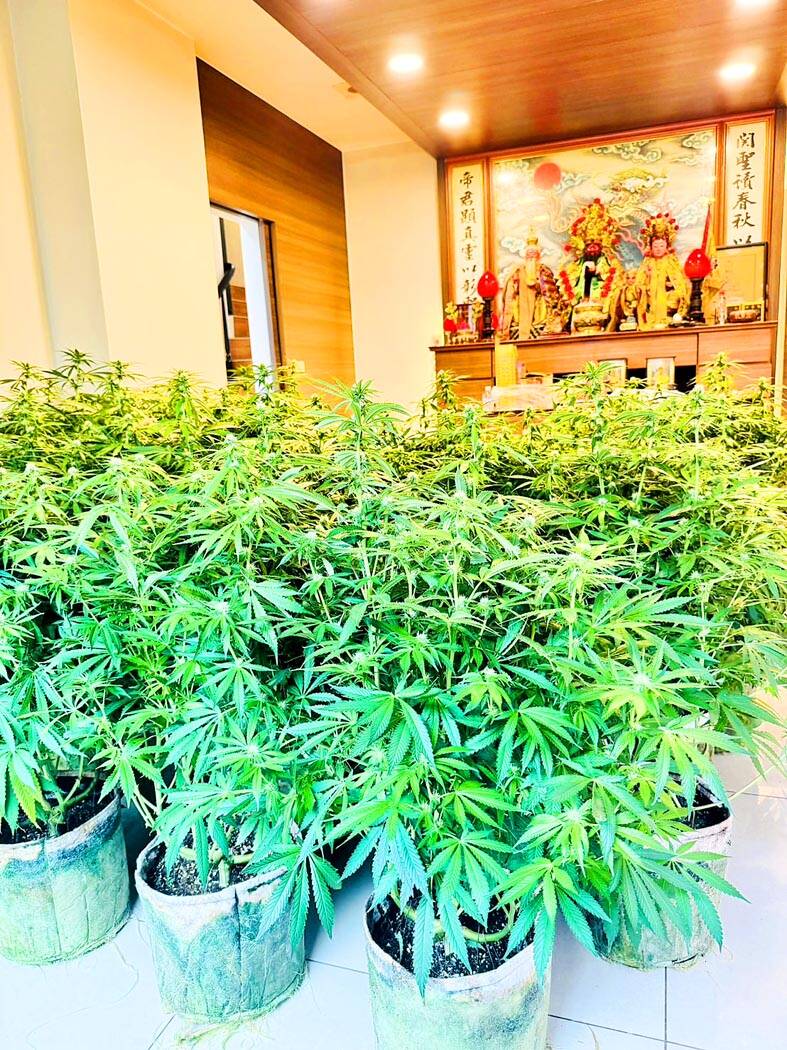A man was arrested on March 10 for allegedly growing cannabis at his Chiayi City residence, while he and three others were also charged with selling the prohibited narcotic via social media, the Taipei City Police Department’s Songshan (松山) Precinct said in a statement released on Tuesday.
It said that 97 cannabis plants, 2,283.4g of cannabis products, 22 vape pens and gardening equipment were seized in a raid of the residence that was based on the monitoring of a social media group.
The seized material was worth about NT$10 million (US$313,794), the statement said.

Photo: CNA
The group was discovered by officers who are part of the “Operation Safe Home” drug prevention program, the statement said.
The precinct organized a joint taskforce with the New Taipei City Police Department’s Jhonghe (中和) Precinct and the Chiayi City Police Bureau, with the Tainan District Prosecutors’ Office heading the investigation, the statement said.
The main suspect, a 33-year-old man surnamed Chen (陳), learned how to grow cannabis online, it said.
He traveled to Thailand, where cannabis is legal, to advance his planting skills, it said.
Chen packaged products and his wife — one of the other suspects — helped him sell them, it said, adding that they spread word via social media.
An initial tally showed that the four earned about NT$2 million from the operation, the statement said.
Chen told officers that he had made deals in Thailand and spent almost NT$2 million to procure a license to sell cannabis products in the southeast Asian country, the statement said.
Chen and the other three suspects were transferred to the Tainan District Prosecutors’ Office for further investigation over alleged contraventions of the Narcotics Hazard Prevention Act (毒品危害防制條例).
Chen was released on NT$150,000 bail and restricted from leaving the country, police said.
Another suspect was released on NT$20,000 bail, while the two others were released without bail, police said.

SHIPS, TRAINS AND AUTOMOBILES: The ministry has announced changes to varied transportation industries taking effect soon, with a number of effects for passengers Beginning next month, the post office is canceling signature upon delivery and written inquiry services for international registered small packets in accordance with the new policy of the Universal Postal Union, the Ministry of Transportation and Communications said yesterday. The new policy does not apply to packets that are to be delivered to China, the ministry said. Senders of international registered small packets would receive a NT$10 rebate on postage if the packets are sent from Jan. 1 to March 31, it added. The ministry said that three other policies are also scheduled to take effect next month. International cruise ship operators

NUMBERS IMBALANCE: More than 4 million Taiwanese have visited China this year, while only about half a million Chinese have visited here Beijing has yet to respond to Taiwan’s requests for negotiation over matters related to the recovery of cross-strait tourism, the Tourism Administration said yesterday. Taiwan’s tourism authority issued the statement after Chinese-language daily the China Times reported yesterday that the government’s policy of banning group tours to China does not stop Taiwanese from visiting the country. As of October, more than 4.2 million had traveled to China this year, exceeding last year. Beijing estimated the number of Taiwanese tourists in China could reach 4.5 million this year. By contrast, only 500,000 Chinese tourists are expected in Taiwan, the report said. The report

The Forestry and Nature Conservation Agency yesterday launched a gift box to market honey “certified by a Formosan black bear” in appreciation of a beekeeper’s amicable interaction with a honey-thieving bear. Beekeeper Chih Ming-chen (池明鎮) in January inspected his bee farm in Hualien County’s Jhuosi Township (卓溪) and found that more than 20 beehives had been destroyed and many hives were eaten, with bear droppings and paw prints near the destroyed hives, the agency said. Chih returned to the farm to move the remaining beehives away that evening when he encountered a Formosan black bear only 20m away, the agency said. The bear

HORROR STORIES: One victim recounted not realizing they had been stabbed and seeing people bleeding, while another recalled breaking down in tears after fleeing A man on Friday died after he tried to fight the knife-wielding suspect who went on a stabbing spree near two of Taipei’s busiest metro stations, Taipei Mayor Chiang Wan-an (蔣萬安) said. The 57-year-old man, identified by his family name, Yu (余), encountered the suspect at Exit M7 of Taipei Main Station and immediately tried to stop him, but was fatally wounded and later died, Chiang said, calling the incident “heartbreaking.” Yu’s family would receive at least NT$5 million (US$158,584) in compensation through the Taipei Rapid Transit Corp’s (TRTC) insurance coverage, he said after convening an emergency security response meeting yesterday morning. National